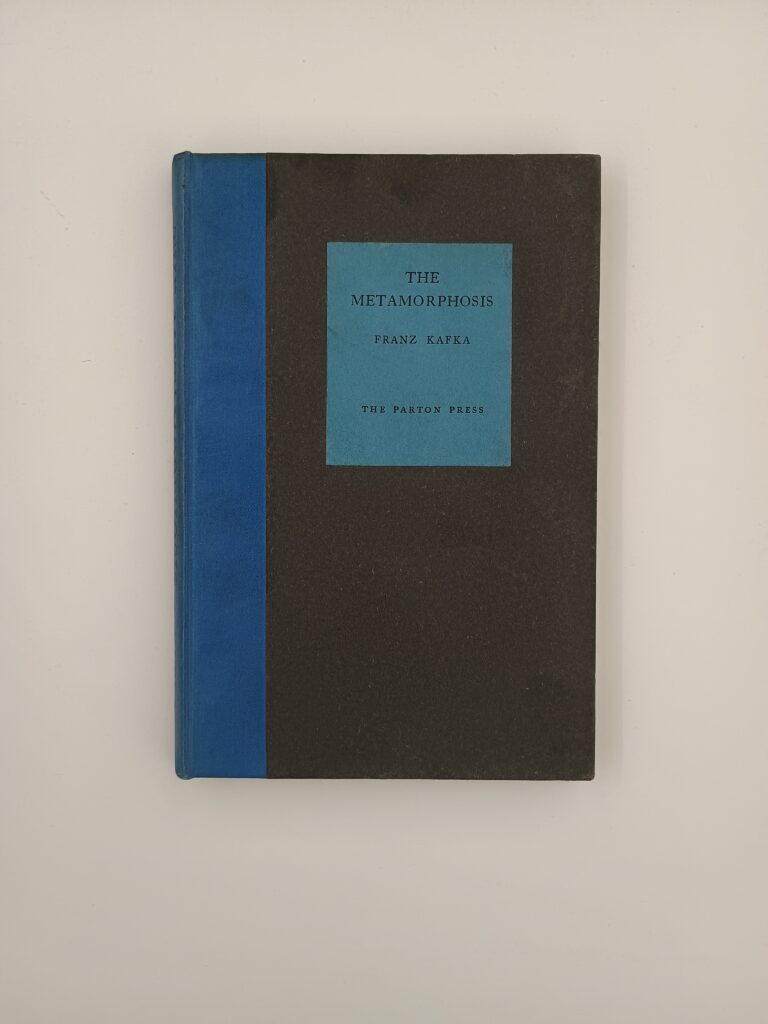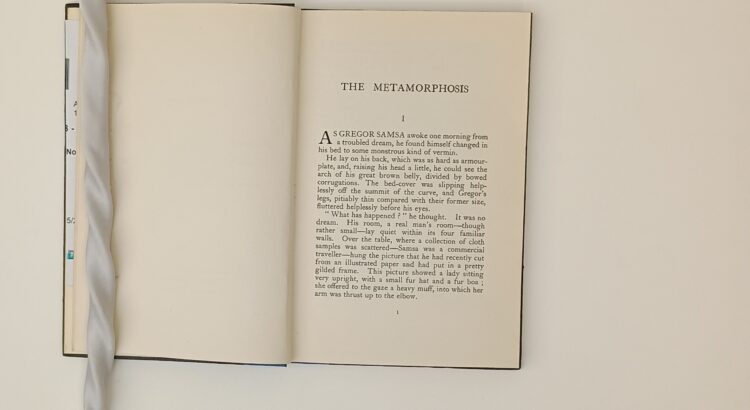3rd June 2024 is the centenary of Franz Kafka’s death so I have been looking at early English language translations of his work in our collections including a 1937 edition of the classic novella “The Metamorphosis”. It is a very attractive little book and almost certainly the first time this story was published as a standalone text in English. I was though surprised to see it was translated by A.L. Lloyd.
A.L. Lloyd (1908-1982) is not a household name unless you live in a household of folk music fanatics. Lloyd was an English folk singer and collector of folk songs and a key figure in the post World War II British folk revival. He was probably the first person to call himself a folklorist and in 1959 co-edited “The Penguin Book of English folk songs” with Ralph Vaughan Williams, a key text in the revival of interest in traditional song. Bob Dylan and Paul Simon know who Lloyd is and almost certainly meet him when they visited Britain in the early 1960s. Without the work of Lloyd and a few other pioneering folk song researchers in Britain and the United States, Dylan who was a teenage Little Richard fan might have stuck to rock music and Paul Simon may never have recorded “Scarborough Fair”.
My initial thought was they must be more than one A.L. Lloyd and that the folklorist and translator of Kafka are two different people. A little research though revealed that they are one and the same person and the outline of a remarkable life. His father was an early AA patrolman, his mother sang traditional folk songs around the house thus inculcating what would became a lifelong obsession for her son. After his mother’s early death A.L. Lloyd was sent as an assisted migrant to Australia at the age of fifteen. Here he worked on sheep farms and began to write down the folk songs his colleagues sang. He also discovered the State Library of New South Wales, the oldest library in Australia and began his researches into traditional music. He returned to Britain in 1935 at the height of the Great Depression and unable to find work became a reader at the British Museum where he continued his researches and also became a translator. In 1937 in addition to his translation of Kafka he also published a translation of poems by Federico García Lorca (1898-1936) the Spanish poet and playwright who had been assassinated the year before at the beginning of the Spanish Civil War. It was a busy year as Lloyd also signed up as a crew member of a whaling ship bound for the Antarctic. In 1956 he briefly featured in John Huston’s film adaption of “Moby Dick” singing a sea shanty.
After his brief career as a whaler he largely dedicated the rest of his life to researching, recording and promoting folk music. He was a prolific recording artist both solo and with Ewan MacColl with whom he recorded nine albums of English and Scottish folk ballads in the early 1950s. He did publish one more translation, “The Drinker” by the German novelist Hans Fallada (1893-1947) in 1952. “The Drinker” was a posthumously published autobiographical novel about a man’s struggle with alcohol which leads to him being imprisoned in a criminal asylum. Fallada had written the novel in code to avoid detection when he himself was detained in an asylum. For many years a largely forgotten writer in 2009 a new translation by Michael Hofmann of Fallada’s 1937 novel “Alone in Berlin” was a bestseller in the UK and USA.
Lloyd’s translation of “The Metamorphosis” made little impact and went quickly out of print. A translation of the same text by Scottish married couple Edwin and Willa Muir became the standard English edition and Lloyd’s version fell into obscurity. It is a diligent and readable translation and fairly close to the Muir’s more successful version but with one very striking difference. “The Metamorphosis” has one of the most famous opening lines in 20th century literature. The Muir’s translation is “As Gregor Samsa awoke one morning from uneasy dreams he found himself transformed in his bed into a gigantic insect”. In other translations Gregor Samsa is transformed into an “enormous bug”, “monstrous cockroach”, “giant bug”, or “vile insect” or other variants on the Muir’s “gigantic insect”. In the Lloyd translation the opening page of which appears at the top of this blog the first line is “As Gregor Samsa awoke one morning from a troubled dream, he found himself changed in his bed to some monstrous kind of vermin”. In Kafka’s original the creature Samsa is transformed into is described as “ungeheuren Ungeziefer”. The German word “Ungeziefer” literally means an unclean animal not suitable for sacrifice but in everyday speech can be used to mean a bug or vermin. Lloyd is unusual among translators in using vermin, although the acclaimed 1972 translation by Stanley Corngold goes for “monstrous vermin” and in 2007 Ian Johnson neatly combines both possible translations with “monstrous verminous bug”. After being out of print for many decades Faber republished Lloyd’s translation in 2015 with an introduction by novelist Richard T. Kelly to mark the centenary of the first publication of “Der Verwandlung” ,the German title of “The Metamorphosis”, in 1915. An American edition of Lloyd’s translation was published in 1946. Vladimir Nabokov (1899-1977) would annotate his copy of this edition as part of his preparations for lecturing on Kafka’s masterpiece at Harvard.

